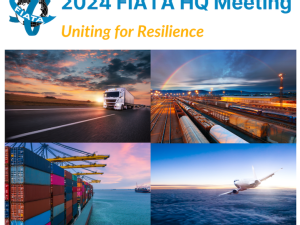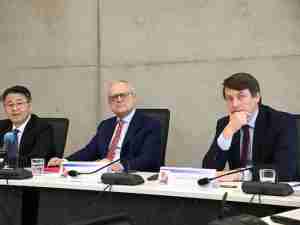U.K. to Make Decision on London Airport Expansion Next Week
By: | Oct 18 2016 at 12:26 PM | Air Cargo
The U.K. government will decide next week whether to expand London’s main airport, Heathrow, or its rival Gatwick putting an end to decades of prevarication over what has become one of the most contentious issues in British politics.
The preferred option will be chosen by the cabinet’s Economy and Industrial Strategy Sub-Committee with responsibility for airports, Prime Minister Theresa May’s spokeswoman, Helen Bower, told reporters in London on Tuesday, after ministers discussed the topic for more than an hour without reaching a conclusion. The final decision will be put to Parliament in the winter of 2017-18 after a public consultation.
May will also allow any dissenting ministers to make public their objections to the decision. Foreign Secretary Boris Johnson and Education Secretary Justine Greening are both known opponents of extending Heathrow, Europe’s busiest airport. In a note to her colleagues made public after the cabinet met, the prime minister said those with “strongly held views” would be free to express them during the subsequent public debate, though not in Parliament.
There are two options for expanding Heathrow, on London’s western edge. One involves the construction of a third runway at a cost of 16 billion pounds ($19 billion). The second, costing 12 billion pounds, would extend one of the existing runways. Both would allow the 70-year-old hub to handle 135 million passengers a year, up from 75 million passengers now. The alternative is to build a second landing strip at Gatwick, the world’s busiest single-runway airport, about 30 miles (50 kilometers) to the south of the capital.
‘National Interest’
“The prime minister made clear this was an important infrastructure decision for the country which has been delayed for too long,” Bower said. The decision, whichever option is preferred, is “in the national interest” and will provide a boost to business, she said.
A government-appointed commission said last year that Heathrow is the best candidate for growth amid a crunch in flight capacity in southeast England. But May’s predecessor, David Cameron, put off a decision in December when he said more studies were needed on the environmental impact of expanding a hub surrounded by the urban sprawl of west London and with flight paths over the center of the city.
A decision on Heathrow had already been delayed until after the 2015 election when Cameron appointed the Airports Commission led by former Financial Services Authority Chairman Howard Davies. While Davies shortlisted three proposals for adding capacity—including a second runway at Gatwick and an extension of one of the two existing runways at Heathrow—he concluded that the third-runway plan was superior.
Resignation Threat
Former London Mayor Johnson now represents an electoral district to the north of the airport, while Greening’s west London constituency lies under the approach to Heathrow. The Conservative candidate in this year’s London mayoral election, Zac Goldsmith, has threatened to resign from Parliament and force a by-election in Richmond, near Heathrow, if the hub is expanded.
Allowing a process whereby ministers can voice objections “is a mature, common-sense approach reflecting the fact that certain ministers have long-held views,” Bower said.
Indecision over expansion has seen Heathrow’s position weakened in recent years as competitors including Frankfurt, Amsterdam and Paris Charles de Gaulle added flights on their multiple runways. Fast-growing hubs further east, including Dubai and Istanbul, are also grabbing a bigger share of the most lucrative long-haul transfer traffic.
Future Strategy
On Monday, Transport Secretary Chris Grayling dismissed the idea that the government might approve competing expansion plans for both Heathrow and Gatwick.
“I think right now, given how long it’s taken this decision to happen in the first place, my focus would be on doing what we should do now,” Grayling told the House of Commons Transport Committee. “Then either this government or a future government can look at what future strategy needs to be.”











